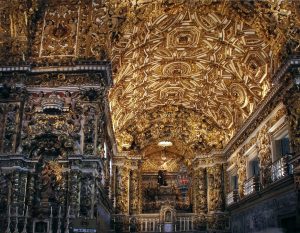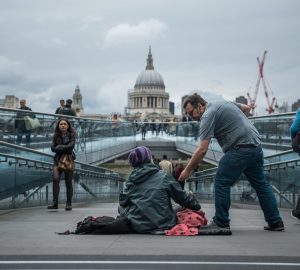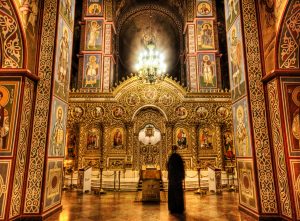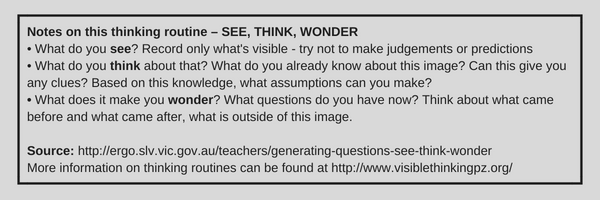Youth Resource
Treasures on earth: the medieval papacy and its opponents
This segment comes from Episode 3: Rich + Poor.
From decadent medieval popes to modern televangelists with private jets, religion and money can make for an unsavoury mix. But why do we think of charity – care for the poor and the sick – as a good in the first place? The Graeco-Roman world didn’t think so: they mostly thought the poor and suffering deserved what they got. It was Jewish thought, turbocharged by the teaching of Jesus, that transformed the way we think vulnerable people should be treated. This segment looks at how far the medieval papacy strayed from Jesus’ teaching on money, and how one abbot protested this by giving all he had to the poor.
Videos
-
Treasures on earth
The medieval papacy offers a vivid picture of a church corrupted by wealth.
Transcript
JUSTINE TOH: Jesus had warned his followers not to “store up treasures on earth”, but it appears the medieval church was busy doing just that.
Popes, bishops, monks – many had forgotten their responsibility to the less fortunate, and were instead acquiring a taste for pomp and luxury.
The church might have had God on its side, but people knew that something just wasn’t right. The Italian poet Petrarch took a long, hard look at the court of the Popes, here in Avignon, and couldn’t conceal his disgust.
ACTOR (PETRARCH): Here reign the successors of the poor fishermen of Galilee; they have strangely forgotten their origins. I am astounded, as I recall their predecessors, to see these men loaded with gold and clad in purple, boasting of the spoils of princes and nations; to see luxurious palaces and heights crowned with fortifications, instead of a boat turned downwards for shelter.
NICK SPENCER: If you wanted an image of the Kingdom of God, I don’t think you’d go to the medieval papacy to give it to you. It’s another one of those great examples, you know, in the same way as people followed the Prince of Peace violently, they followed the man who came in poverty through riches. It’s remarkable how quickly we can drift away from the original message and the original person. There are no shortage of stones that you can pick up and throw at the medieval papacy for being opulent and corrupt and self-serving.
JUSTINE TOH: Searing criticisms of the church were also emerging from within its own ranks. Saint Odo was the second abbot of the great monastery of Cluny, in the south of France. And he raged against the oppression of the poor by the rich and powerful.
ACTOR (ODO OF CLURRY): How then are these robbers Christians? If we judged by realities we should give honour not to the rich for the fine clothes that they wear, but to the poor who are the makers of such things. For the banquets of the powerful are cooked in the sweat of the poor.
JUSTINE TOH: Odo was particularly scathing about holy men who preached piety, but whose lives were decadent beyond belief. He accused them of being bloated by materialism, full of pride, and entirely at the whim of their desires. Such opulence revolted him. By contrast, his own charity was so limitless, it threatened to bankrupt the abbey.
His biographer, one John of Salerno, recounts a time when he and Odo were passing through famine-stricken Sienna on a diplomatic mission.
John confesses he snuck off with the meagre remains of their travel budget because he knew that, given half the chance, Odo would give it all away. True to form, in John’s absence, Odo invited a stream of beggars to accompany him. He even paid exorbitant amounts for the shrivelled berries of those who were too proud to beg. And when Odo and his throng of beggars found John, the elderly abbot announced: “These are the servants of God and our labourers. Hurry up, therefore, and give them their wages.”
If the medieval church was accustomed to enriching itself, then Odo was in the habit of giving away every cent he possibly could. He might have had harsh words for greedy churchmen, but his life was the strongest criticism of them all.
close
Engage
- Read the following quotes about money, and discuss:

- Which quote do you agree with the most? Why?
- Which quote do you agree with the least? Why?
- Write your own quote about money.
- On this scale, plot how important you think money is to happiness.

- Observe the following images and record your thinking in the table below.
Understand & Evaluate
Before watching the segment, define the words in this table to help you understand the key ideas in the video:
Watch the segment: Treasures on earth: The medieval papacy and its opponents
- Jesus warned his followers not to “store up treasures on earth”.
- What do you think he meant by this?
- In what ways was the medieval church failing to reflect this ideal?
- Read this quote from Petrarch, a scholar and poet in Renaissance Italy. In your own words, explain the contrast he has outlined.
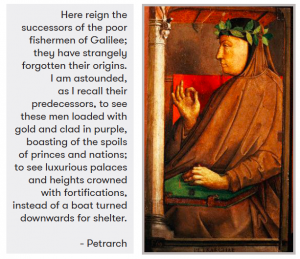
- How did Odo feel about the decadent lifestyles of church leaders? What actions did he undertake as an individual in response to his feelings?
- Role-play the events that occurred on Odo and John’s journey through famine-stricken Siena, and answer the following questions:
- What strikes you about this account?
- How was Odo’s life a strong criticism of greedy churchmen?
Bible Focus
Read Matthew 6:19-21.
- Complete the following sentences:
- Jesus says: do not …
- Jesus says: instead …
- Outline the main reason Jesus gives for not building up possessions on earth.
- Explain two reasons, from the passage, why followers of Jesus should focus on “heavenly treasures”.
- Do you think these teachings of Jesus make sense? Why or why not?
Read 2 Corinthians 8:1-12.
- Outline three insights that this letter, from Paul to the Corinthian church, gives into what the early church was taught about money and generosity.
Apply
- Discuss the following statements:
- “You can’t live in a huge house if you are really serious about following Jesus.”
- “Christians shouldn’t spend any money on entertainment. They should give that money to the poor instead.”
- “On the weekend, my train went past a church that was huge! It had a brand-new building that would’ve cost at least 2 million dollars to build. I just don’t think churches should be spending that kind of money.”
- Draw a picture to describe what a modern-day Odo would look like.
- In what ways have you seen Christians and Christian organisations live consistently with Jesus’ teachings of generosity and loving God, rather than money?
Extend
- Read this article in The Telegraph – ‘Pope Francis shuns papal apartment for Vatican guesthouse‘ – and write a paragraph response to each of the following questions:
- How has Pope Francis responded to the wealth available to him as Pope?
- What might this show us about Pope Francis’ character and values?



